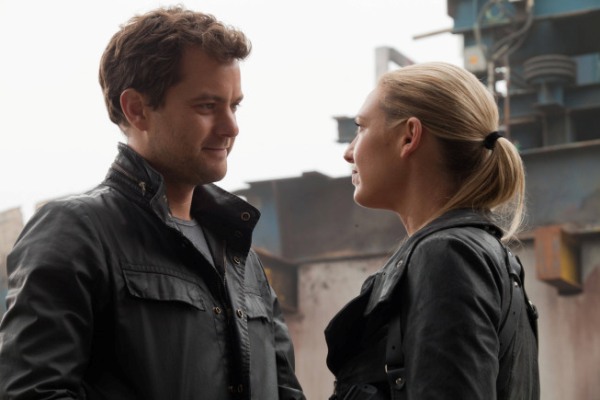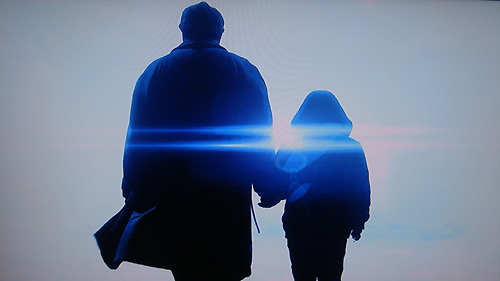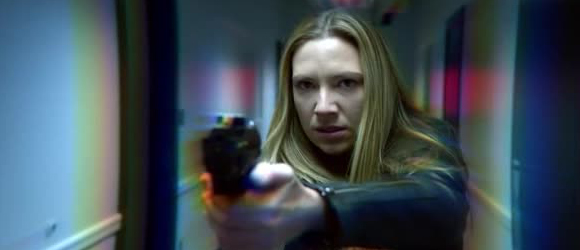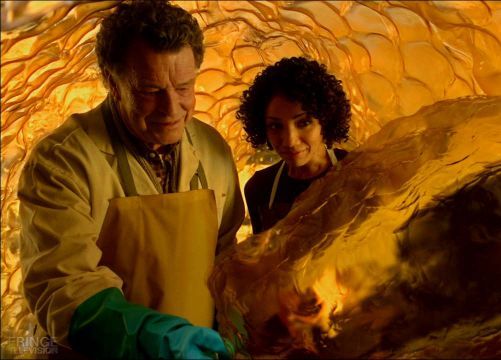“Fringe” Series Finale And the Journey to the End
The series finale of Fringe came with a whole lot of feelings. To tell the truth, part of the reason I waited an entire week after the finale to put the finishing touches on this post was because it meant admitting that this series that I am still rather attached to has actually come to an end. After watching, processing, and scrolling through all the GIF sets on Tumblr, I’ve managed to gather my thoughts on how the series concluded and the final two hours “Liberty” and “An Enemy of Fate”.
Fringe has asked a lot of its audience over the years requiring that they pay close attention and have faith as the series has gone through significant shifts throughout the series’ five season run. This daring approach to storytelling is part of the reason why the ratings were consistently hovering around barely acceptable and it’s a wonder I’m writing something other than fan-fiction for the series finale in season 5.
We’ve crossed universes, gained and lost characters and even entire timelines. When Peter disappeared into the machine at the end of season 3 we were asked to recalibrate our understanding of these characters based on a rather significant change in this new timeline’s history. For a show that has relied so heavily on our investment in our characters, their relationships and the power of love – these subtle, yet in many ways significant, changes in the new timeline made it very difficult for many viewers to continue feeling invested.
I was one of the viewers that got lost along the way, and I’m very happy to report that the series finale brought me back to a place where I once again felt connected with the show.
I’ve been a diehard Fringe-fan since a marathon of the first season under careful guidance of a good friend got me hooked. I dove into season two, then three with complete faith that the writers would find a way to make the increasingly insane stories work and believed that my beloved characters would be done justice. I was never one to get hung up on the science, and really, what’ the point? The reason Fringe works is because we believe in the family of the Fringe division, not the science of the cases they’re combating.
The decision to pick up the final season in 2036 first glimpsed in season four’s “Letter’s of Transit” was once again a daring choice on the part of the Fringe creative team. Following up on one of my favourite episodes from that season seemed very exciting if not worrisome about the pieces of story that might be left behind.
When season four returned to a different world I felt disconnected from these new versions of the characters I had invested so heavily in. I still enjoyed the show but getting back into the world took extra work, learning the intricacies and history that informed the relationships of this set of characters.
The trouble I had with this final season came in two parts. The first was that from the time we saw the dandelion find a way grow through the concrete in the season premiere, the force of optimism and belief in the power of love that fueled the show up until this point drained out quite quickly for a good chunk of the remainder of the series. The second was the a general shift away from the family of the show and the awkward moments of info-dump that were designed to help us understand this particular dystopia and the back story of the now very active Observers.
What worked about the series finale was that it went back to the core tenants of the show that made it excellent. It was about family, morality, the ethics of power and the universe altering effects a selfish, or selfless decision can mean. From the moment Walter went through the alternate universe mirror (which makes a big reappearance in the finale), to the machine and the morality of many of the fringe science projects the show has been about the ongoing human dilemma of what it means to make the right decision, and what it means to live with a decision that has no right answer.
A lot of what worked in this series finale was a strong sense of purpose. Michael and Donald/September’s bond quite literal mirrored the father/son relationship of Walter and Peter that has been at the centre of Fringe from day one. Walter broke the universe to save his son and in the wake of this individual versus the broader good caused more damage than he could have ever anticipated. Donald/September in contrast was not individually responsible for the damage The Observers caused to humans on Earth but understood that he now had the power to fix it and his adopted son Michael (Anomaly XB-6783746) was not only the key to saving the world but needed saving himself.
It was John Noble’s portrayal of Walter in his resolve to redeem himself from past sins by saving the world that reduced me to tears. Since Michael’s touch Walter had recovered memories of being loved by his son and spent the episode reconciling the decision to sacrifice himself for the greater good based on the knowledge that he had lived and been loved. I should have known better, but if Fringe has taught be anything it is to have hope. If sci-fi has taught me anything someone more important had to die in the end. Unfortunately, my Fringie-optimism got the better of me and when Walter ultimately said goodbye to his family so they could recover their own daughter and the world they live in it was both heartbreaking and a completely worthy, rewarding end for his character.
The Peter and Olivia relationship has (almost) always been such a thing of beauty. I should restate that, Olivia Dunham is one of my absolute favourite characters on television. From the moment she rescued herself from capture and had the good sense to save the evidence back in season one I was forever sold on this woman and have continued to love the incredibly layered, nuanced woman that exist(ed) on our televisions. This is why her relationship with Peter works so well. They are each their own people in their own rights. They belong together but can exist alone. They take turns being needy and being strong. Their relationship bucks certain television gendered-stereotypes in a way that is refreshing but doesn’t call attention to itself.
In the finale we call back to the rift that Etta’s first disappearance caused in the relationship as Olivia is the risk-taker, refusing to stop fighting for her daughter regardless of what it might cost her. She takes on the cortexiphan, she takes on the time travel and she will do anything to save her daughter for the sake of the life she didn’t get to have the first time around. She is the warrior. Peter doesn’t care any less but his reactions are less narrow, he believes in his amazing, powerful, capable wife but he doesn’t want to lose any more than he already has.
Peter’s fear is no less heroic than Olivia’s determination. It is what keeps us honest, from making stupid, rash mistakes and loosing everything in a dangerous gamble. What is unusual in this case is that traditionally this role is something bestowed upon female characters who stand for rational thinking and protecting the family that is still standing. Olivia is not fearless either, her fear manifests itself in a different way that pushes her past her capabilities in her determination to win.
The thing of beauty that makes Peter and Olivia work is in the moments when they support each other through the crazy and through the hard moments. When Peter hides his fear when his argument is lost. Gives Olivia the trust and support she needs and believes in her. They are such a fantastic supportive couple, basically the Mr. & Mrs. Coach of science fiction.
Olivia says the battle she is fighting is about Etta, and this singularity of purpose almost feels like an uncomfortable parallel to Walter’s first mistake when he crossed universes out of grief for a child. This is different, an entire universe is at stake, though she doesn’t completely consider the risk that will be posed to the other-verse for the sake of their own.
I loved that all the callbacks fit really nicely into the final arc. Astrid, ever the behind the scenes problem solver, brought back the universe window and Gene. Then there was the cortexiphan, and the red-verse.
When we left the red-verse and my TV-boyfriend Lincoln Lee for the last time I never thought we would see them again. The rescue of Michael from the Observer’s prison was the perfect excuse to venture back into that world one more time. It also provided what may have been the best line of the series “Stop checking out my young ass”, delivered by the impeccable Anna Torv in which all the tension that had been building up during this dark season evaporated in that moment when Altlivia smiles self-assuredly and Lincoln follows suit.
It’s not Fringe if the big, fancy, noble, touching scene about hope and love and family and protecting our children between Walter and Donald/September if it’s not juxtaposed with totally gross bacteria popping out of people’s bodies? Plus the return return of the razor butterflies and a number of other dangerous Fringe cases. … I couldn’t help but think Peter and Olivia should be wearing gloves along with those gas masks but hey – love is what’s really going to save ‘em.
It was so fitting that it was Olivia’s special cortexiphan fueled abilities that not only allowed her to travel through universes but provided the final hit against the Observers as she gained control over her power. The flickering lights called back to Olivia harnessing her powers in the lightbox test in season one’s “Ability”.
The closing was perfect. It brought the optimism and love back into the series. Walter was finally able to get some peace. He found the loving relationship he had long desired with his son, he found purpose and family and had a chance to redeem himself of his sins. Peter and Olivia were given a second chance at a happy life with Etta.
I’d like to imagine that Astrid, Broyes and Nina were able to continue on in a way that was positive and fulfilling but the moment in the park was far more effective than any wrap up montage could have been.
Other notes:
- That last scene in the park was possibly more full of tension than it had to be. My heart stopped as Peter looked back filled with dread that Etta wouldn’t be there, or the Observers would have still arrived. Anyone else?
- In a police state where crazy powerful Observers rule does anyone find it a bit wacky that they really couldn’t keep tabs on four fugitives. I know the team is good, but still.
- There was something very familiar about a mad old doctor taking a young woman’s hand and saying “trust me”…while injecting her with cortexiphan. The same mad old doctor that when asked why anti-gravity bullets? “Because it’s cool”.
With Fringe coming to a close it really does feel like an end of an era. Did the final episode give you the satisfying ending that you wanted? Did you anticipate a different ending? Share your thoughts in the comments!











